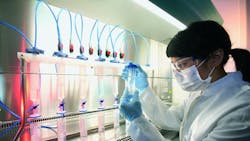Investors may be digesting a deal from Bristol-Myers Squibb Co. for Celgene Corp. and getting their teeth into AbbVie Inc.’s bid for Allergan Plc, but there are plenty of other large-cap biotechs and pharma still hungry for action.
“Do not sleep on the summer,” Jefferies trading specialist Jared Holz cautioned clients in a note. “Conversations with several banking contacts suggest mergers will not slow down in what are normally seasonally slow months.”
Who needs deals? The usual suspects -- large-cap drugmakers with patent cliffs and dwindling pipelines. With the top 20 drugmakers generating over $150 billion a year in free cash flow and facing slowing growth, “there’s high interest from big pharma and big biotech in making acquisitions,” Andy Acker, a lifesciences portfolio manager for Janus Henderson, said in a phone interview.
With regards to whether those deals will be mega-mergers or smaller bolt-ons, “anything is possible,” Holz said via phone. Although there aren’t as many targets left as there were six months ago, larger-scale deals are just as likely as smaller ones, he said.
He predicts the biggest catalyst for the second half may be a deal that closes before any political changes ahead of the 2020 election. “You want to beat the fundamental shift,” he said.
While the number of drug sector deals in 2019 to-date are on pace to match 2018’s total, the volume has exceeded last year’s midpoint thanks to mega-cap deals.
Potential Targets
Vertex Pharmaceuticals Inc., Incyte Corp. and Biogen Inc. are seen among the most likely targets for a large deal. Jefferies’ Holz and Cantor Fitzgerald analyst Alethia Young both called Biogen a “wildcard,” as the company could either be a buyer or seller. Other potential acquirers include Eli Lilly & Co., Pfizer Inc., Merck & Co., Sanofi, Novartis AG and Johnson & Johnson, as well as biotechs Gilead Sciences Inc. and Amgen Inc.
While large caps launch the bulk of new drugs, more than half of the new medicines approved are developed from small and mid-cap company pipelines, according to Acker. This makes biotech catalysts a key focus for investors looking to own a stock before it gets bought.
Still, 90% of new medicines in development never make it to market, Acker cautions, and for those drugs that do win regulatory approval they will still face a commercial risk, especially if they don’t get bought.
Jefferies analyst Michael Yee found that the shares of half of all biotechs that didn’t get bought underperformed in the months that followed a new drug launch.
By Cristin Flanagan
About the Author
Bloomberg
Licensed content from Bloomberg, copyright 2016.
